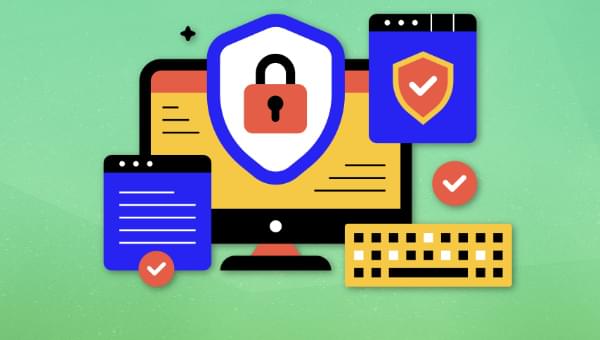In this article, you’ll learn tips and strategies to identify and address common WordPress security issues to protect your website and search rankings from cyberattacks.
In September 2023 alone, over 17,000 WordPress websites fell victim to the Balada Injector malware.
The consequences were devastating for businesses that own those websites.
Aside from paying hefty fees and penalties, business websites compromised by a cyberattack must work extra hard to rebuild their reputation with their existing customers and search engines.
Sadly, not all businesses do.
Key Takeaways
The Indisputable Connection Between Website Security and SEO
Covid-19 dramatically transformed consumer buying behaviors.
Even though people are slowly returning to their pre-pandemic shopping ways, the shopping habits they developed during the pandemic remain.
Consumers still start their buying process online, with more than half of them preferring to use search engines to research products and services to buy.
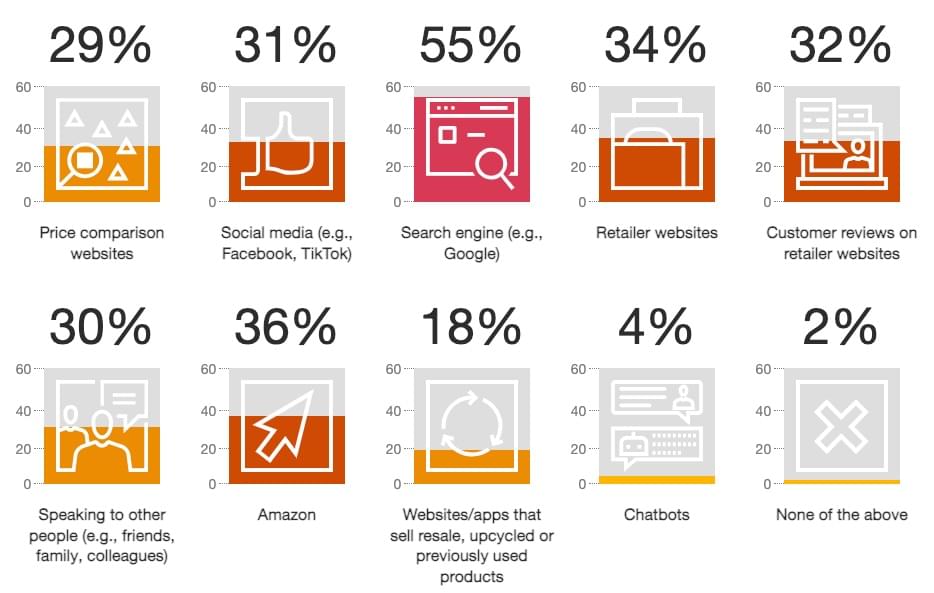
Survey responses to the question, “In general, where do you typically research the items/products you intend to buy?” Source: PwC’s June 2023 Global Consumer Insights Survey
And while in-store shopping is making a comeback, online shopping isn’t slowing down. eMarketer projects that the number of online shoppers will increase to 230.6 million by 2026 in the US alone.
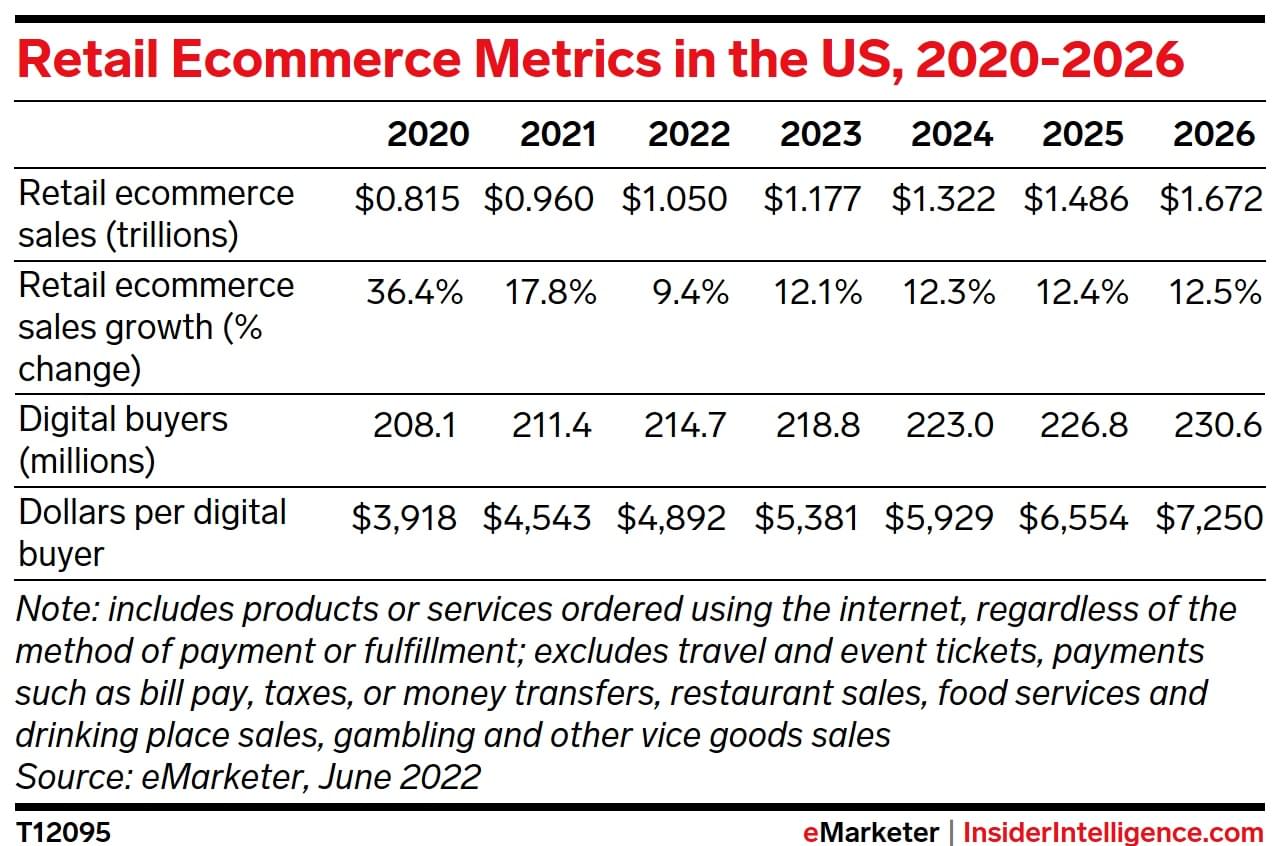
Source: eMarketer
These, plus rapid advancements in artificial intelligence (AI) and internet technology, expect brands to provide them with top-quality products and services and an enjoyable, secure, and easy shopping experience.
This expectation isn’t just limited to ecommerce and B2B websites. Consumers expect to get this type of experience on any website they visit on the internet, including search engines.
That’s why publishing insightful articles and following SEO best practices is no longer enough to rank well on Google and other search engines. You also need to ensure that your website provides your target audience with a user experience that meets — if not exceeds — their expectations.
How Security Breaches Derail Your SEO Efforts
The effects of a cyberattack can be so devastating that some businesses can never recover it.
On top of dealing with the hefty costs associated with a security breach, cyberattack victims are left with a tarnished reputation with their customers and search engines.
Google and other search engines are like any SaaS business in that they’re responsible for the safety of their users’ personal information whenever they use their services.
That’s why they include website security among the top factors they consider when evaluating a website’s overall page experience.
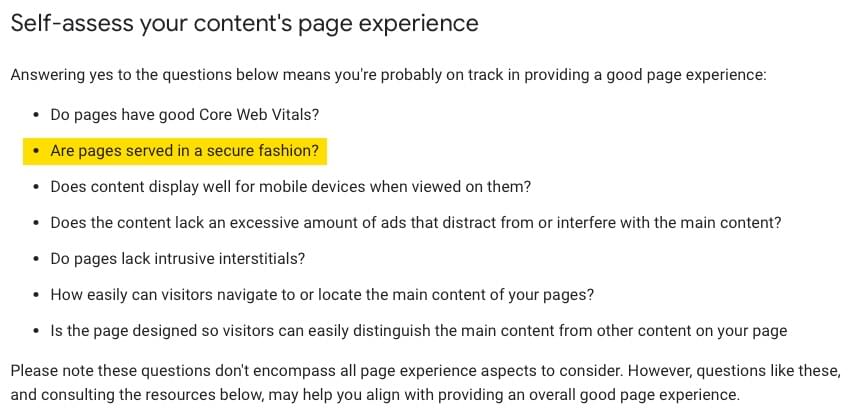
Google’s Page Experience Documentation includes a question focusing on website security.
And they’re not the only ones.
Browsers and websites on which you’ve built backlinks will also prevent users from driving traffic to your website.
Until Google and other search engines remove your site’s URL from their blocklists, browsers will display a notification like this each time someone tries to visit your website.
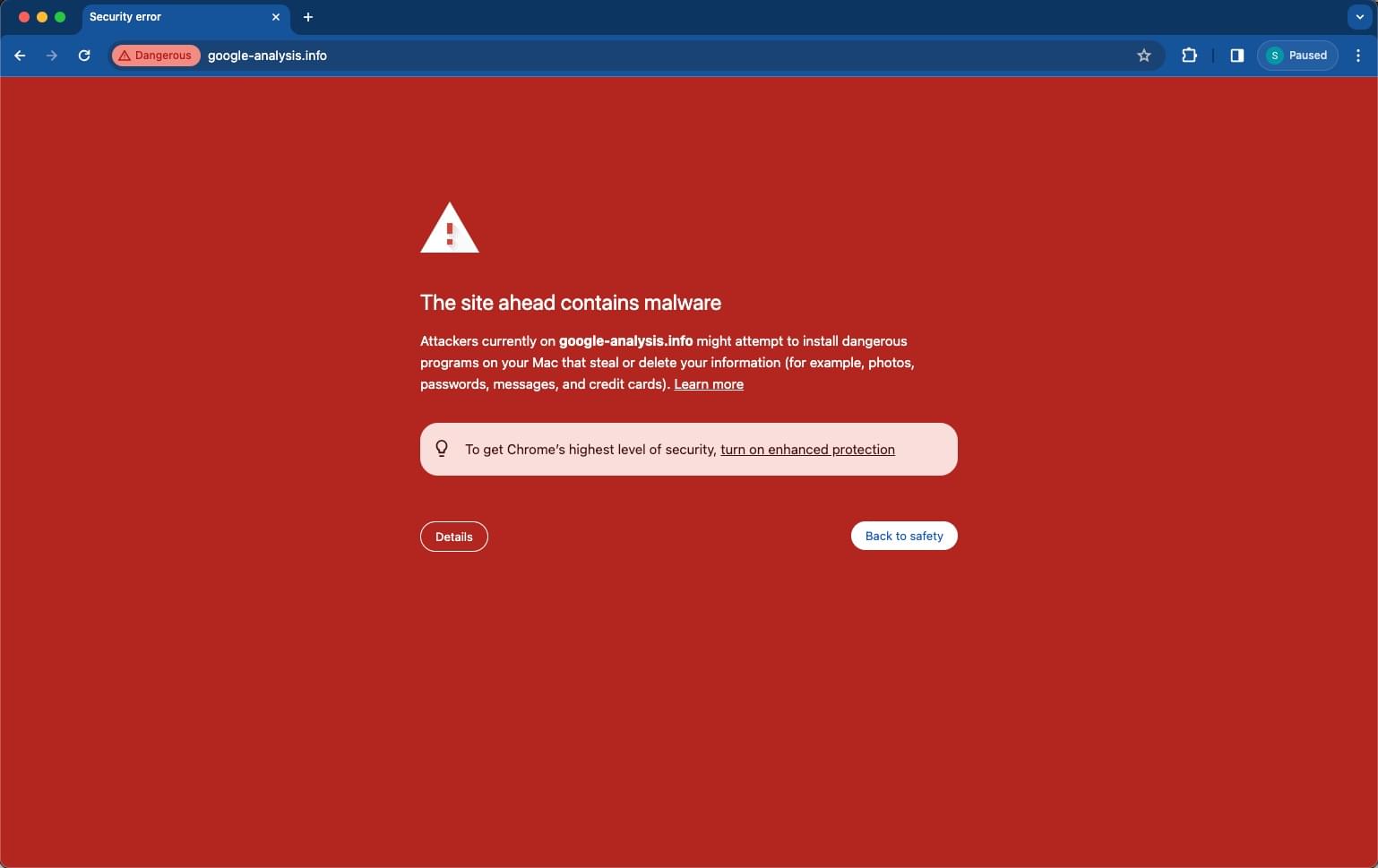
On the other hand, tools like Ahrefs and Semrush will classify backlinks to your website as “toxic” or “malicious”, causing other websites to remove your backlinks from their sites and disavow any links pointing to theirs.
That’s why one of the first signs that your website’s security has been breached is that your website’s no longer getting any traffic.
And even after you manage to get your website out from Google’s blocklist, new and existing customers will bring their business elsewhere and spread the word about the security breach to those in their networks and on online review sites, further bringing your website and SEO efforts downward a vicious spiral.
Leveraging WordPress Security for SEO Advantage: Step-by-Step Guide
Fortunately, there are steps that you can take to protect your website and your customers from cybercriminals lurking around the internet, looking for their next victim.
Step 1: Implement the right SSL certificate for your business
SSL certificates encrypt all the data sent and received on your website, protecting your business and customers’ data and personal information from data breaches.
Most web hosting providers like SiteGround now include SSL certificates as part of their WordPress website hosting services. Still, checking that the SSL/TLS certificate type provides the security level expected for your business and online activities is essential.
For instance, if you own a restaurant, an organization validated (OV) SSL certificate will be your best option since this SSL certificate type verifies that your website is tied to a legitimate business establishment.
Step 2: Keep all your WordPress plugins updated
Reputable WordPress plugin developers would regularly update their plugins to address any vulnerabilities that cybercriminals could potentially exploit. So, make sure to update any plugins once you receive a notification.
Back up your website before updating your WordPress plugins, especially if you’re updating your site builder or security plugins. If the updated plugin causes your website to break or compatibility issues with your other plugins, you can always revert to the previous version.
If you have any installed plugins that their developers haven’t updated for quite some time, deactivate and delete these from your website, as they may contain vulnerabilities that cybercriminals can use as a backdoor to get into your website.
Step 3: Establish a cybersecurity policy for your organization
With businesses adapting remote and hybrid work models, establishing and maintaining a cybersecurity policy within your company has become more critical than ever.
A cybersecurity policy documents guidelines and best practices everyone within your organization must observe to protect your website and WordPress forms from potential security breaches from using less secure internet connections and devices.
Ideally, you’d want to include your cybersecurity policy within your employee contract, handbook, and onboarding process.
Doing this ensures that you properly communicate these policies and the consequences for violating them.
Step 4: Invest in security plugins
Security plugins like Sucuri or Wordfence help block hackers from infiltrating your website by implementing features like firewall protection and limited login attempts.
They also constantly scan your website to find and fix any malware that may have broken through its first line of defense.
If they find any WordPress security issues on your website, these security plugins will notify you so you can take immediate action.
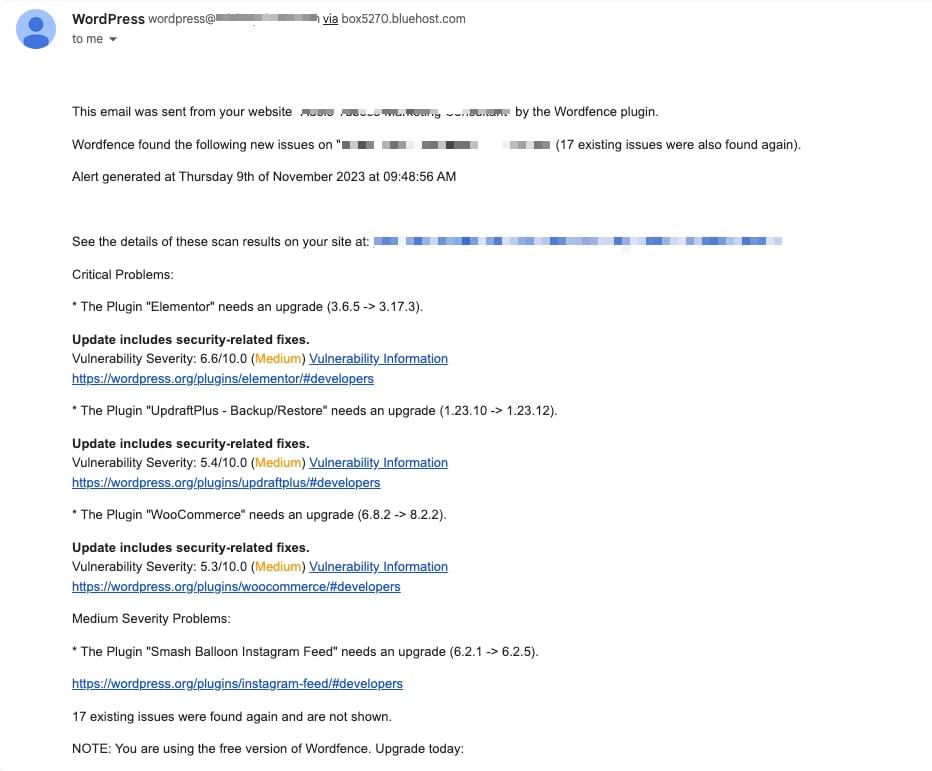
Screenshot of an email alert notification sent out by Wordfence Security to its users
Step 5: Stay vigilant and proactive at all times
Even though you’ve followed the previous steps, keeping a close eye on your website for any WordPress security issues is still essential.
The leaps and strides we’ve witnessed in artificial intelligence and machine learning have, unfortunately, helped cybercriminals refine their hacking techniques.
One of the most common hacking methods is email phishing. This cyber attack tricks people into divulging sensitive information like passwords and credit card details by sending legitimate-looking emails.
Thanks to AI writing tools like ChatGPT, cybercriminals can now send more convincing phishing emails to unknowing victims. One study revealed a massive 1,265% increase in email phishing victims in the months following ChatGPT.
Tools like Ahrefs allow you to conduct regular website and backlink audits to quickly identify and address potential threats like backlinks to low security websites or substantial dips in your website traffic.
Also, ensure that you require your IT team to make it a habit to test and validate the integrity of your customer’s data, especially if you’ve recently started using a new tool or software program.
In today’s digital marketplace, data is a prime commodity.
It enables businesses to make informed decisions that drive revenue and growth.
For cybercriminals, data gives them access to their victims’ bank accounts and credit cards.
Regularly testing your data’s integrity ensures it’s current, accurate, and not corrupted by malware that cybercriminals can use to infiltrate your systems.
Above all, listen to your gut.
If you feel uneasy about an email you’ve received from your bank or the IRS, don’t think twice about calling them to check whether or not the email did come from them.
The inconvenience of spending several minutes on hold to speak to someone about this is nothing compared to the devastating effects of becoming a cyberattack victim.
Boosting Your Domain Rating (DR) with Ahrefs Using Security Measures
Domain rating (DR) is an Ahrefs metric that measures the overall quality of your website’s backlink profile.
It’s the first metric you’ll see when researching a website using Ahrefs’ Site Explorer.
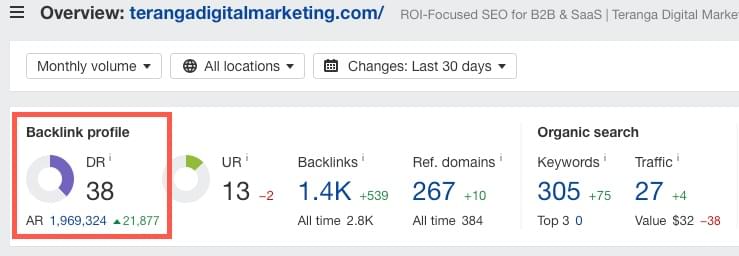
Despite the folks at Google downplaying the role backlinks play on search rankings, your website’s DR score is still a good indicator of how well your website will rank on SERPs.
Here’s why. When choosing which sites to include in its SERPs for a given query, Google lists content quality as a critical factor.
One of the ways they determine a content’s quality is the number of high-authority websites linked to this content.
In short, quality backlinks.
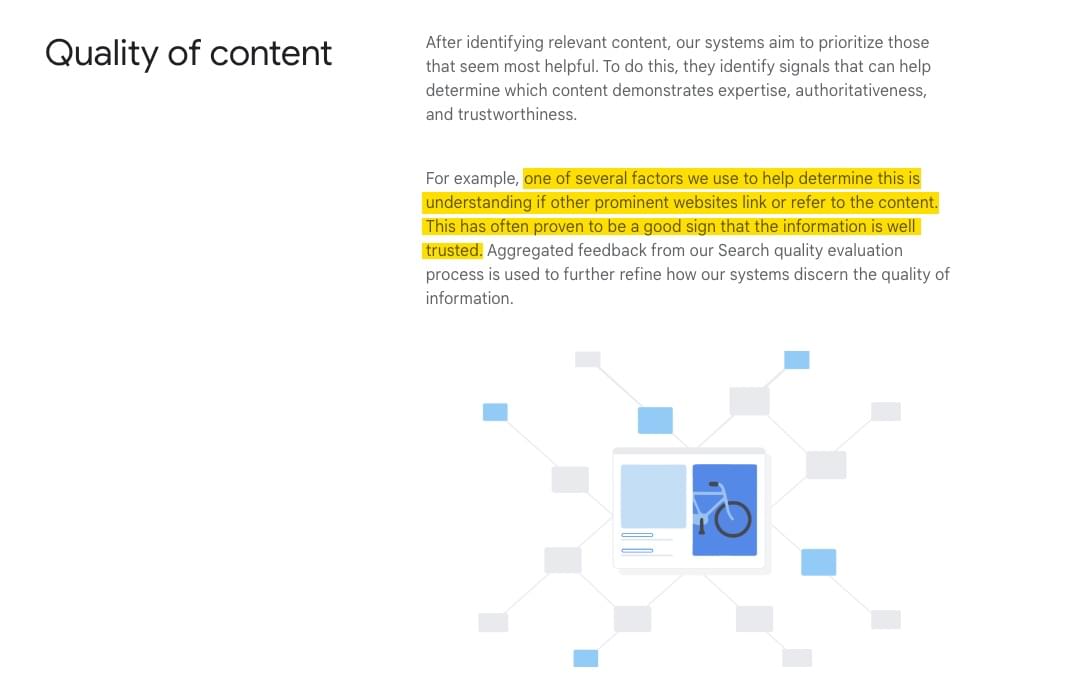
Screenshot from Google Search’s How Results are Automatically Generated document.
These are the same criteria that Ahrefs considers when calculating your website’s DR score.
However, generating lots of backlinks isn’t enough for your website to rank high on SERPs. In fact, it could even cause your search rankings to drop, as my boss, David Ellis, Founder of Teranga Digital Marketing explains:
The best way I can explain this is by saying, “Birds of the same feather flock together.” If you only have a few backlinks pointing to your site, but these are from websites owned by respectable companies and industry leaders, Google will see you as such.
On the other hand, if you generate lots of backlinks, but these are coming from low security websites, guess what? Google and other search engines will also consider your website low quality. So, instead of ranking higher, your search rankings drop, or you don’t appear on SERPs at all!
So, if you’ve noticed your DR score, check where these are coming from by clicking on Referring Domains on the left sidebar.
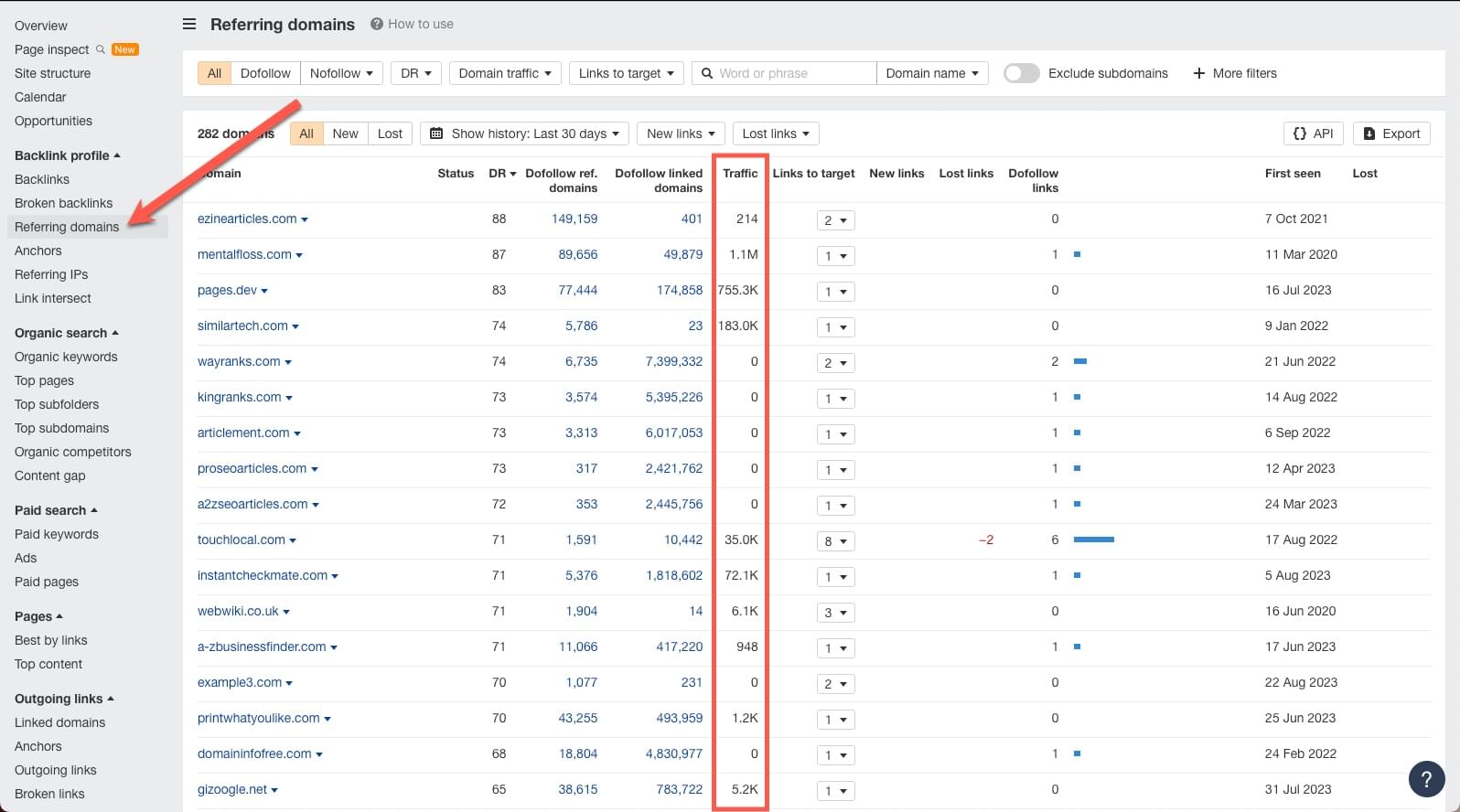
If you see websites with little or no traffic, it could be a sign that this is either a low security or blocklisted website.
Submit these domains to Google using Ahrefs’ Disavow Tool so search bots will ignore these backlinks the next time they crawl your website.
Conclusion
Website security is crucial to building a solid presence online, especially for WordPress websites.
A secure website helps create a trusting relationship with your target customers by ensuring their personal information and transactions are safe and protected from cyber threats.
At the same time, it assures Google and other search engines that you provide your customers with an excellent page experience, resulting in higher search rankings.
The strategies shared in this article are the first steps to securing your website from cybercriminals. Rigorous checking and constant vigilance will help reduce the chances that your website will become a victim of a cyber attack.
 Jaya Iyer
Jaya IyerJaya is a Marketing Manager at Teranga Digital Marketing LTD. She is a seasoned SEO content writer who has written hundreds of blogs in 30+ different niches. When she’s not writing or decoding algorithms you’ll likely find her obsessing over a book! Read Jaya’s blog, Teranga Digital Marketing.
